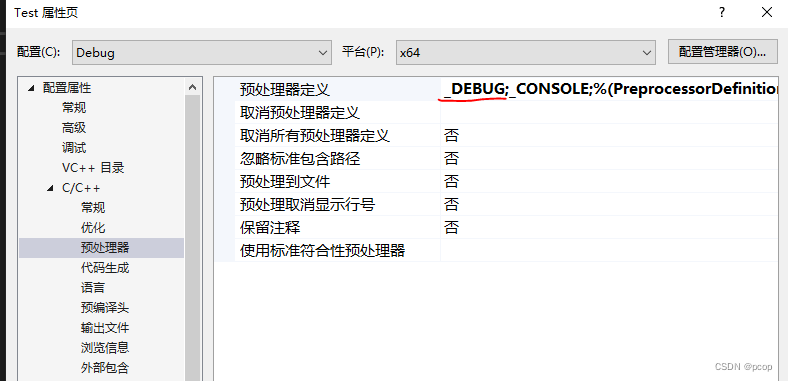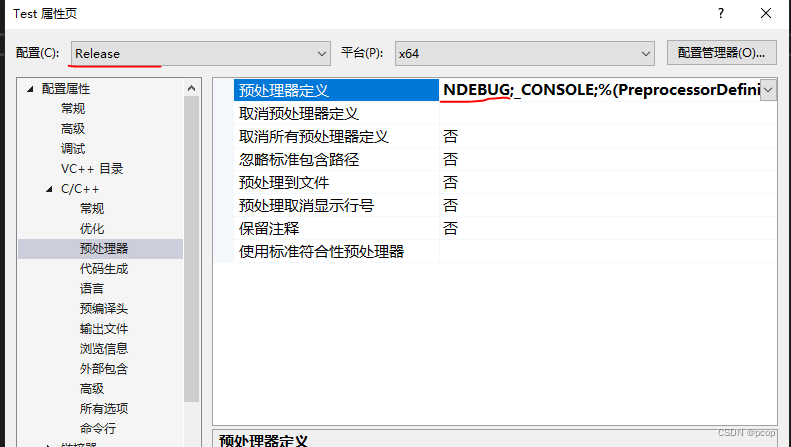C++学习笔记(三十三):c++ 宏定义
发布时间:2024年01月11日
本节对c++的宏定义进行描述。c++使用预处理器来对宏进行操作,我们可以写一些宏来替换代码中的问题,c++的宏是以#开头,预处理器会将所有的宏先进行处理,之后在通过编译器进行编译。宏简单说就是文本替换,可以替换代码中的任何东西,因此过度使用宏会降低代码的可读性。
- #define替换代码中任意文本
-
#include <iostream> #define WAIT std::cin.get(); int main() { //使用WAIT替换std::cin.get();这行语句,但不建议这样写,降低代码的可读性,只是举例用 WAIT } - #define可以传入参数
-
#include <iostream> #define LOG(x) std::cout << x << std::endl; int main() { LOG("Hello World!") std::cin.get(); } - 宏可以进行条件判断。使用宏可以很好的控制日志的打印,例如DEBUG模式下打印的日志信息需要详细一点,而RELEASE模式下则有些日志不需要打印。在Debug模式下添加预处理器_DEBUG,在release模式下添加NDEBUG


-
#include <iostream> //只在DEBUG模式下打印log,release模式下不打印 #ifdef _DEBUG #define LOG(x) std::cout << x << std::endl; #else #define LOG(x) #endif int main() { LOG("Hello World!") std::cin.get(); } - 可以给宏定义复制
-
#include <iostream> //只在DEBUG模式下打印log,release模式下不打印 #if _DEBUG == 1 #define LOG(x) std::cout << x << std::endl; #elif defined(NDEBUG) #define LOG(x) #endif int main() { LOG("Hello World!") std::cin.get(); }
文章来源:https://blog.csdn.net/qq_16701727/article/details/135504771
本文来自互联网用户投稿,该文观点仅代表作者本人,不代表本站立场。本站仅提供信息存储空间服务,不拥有所有权,不承担相关法律责任。 如若内容造成侵权/违法违规/事实不符,请联系我的编程经验分享网邮箱:chenni525@qq.com进行投诉反馈,一经查实,立即删除!
本文来自互联网用户投稿,该文观点仅代表作者本人,不代表本站立场。本站仅提供信息存储空间服务,不拥有所有权,不承担相关法律责任。 如若内容造成侵权/违法违规/事实不符,请联系我的编程经验分享网邮箱:chenni525@qq.com进行投诉反馈,一经查实,立即删除!
最新文章
- Python教程
- 深入理解 MySQL 中的 HAVING 关键字和聚合函数
- Qt之QChar编码(1)
- MyBatis入门基础篇
- 用Python脚本实现FFmpeg批量转换
- Servlet技术之Listener监听器
- 基于微博爬虫python
- 实时云渲染的技术原理是什么?一篇文章讲透云渲染
- YoloV7改进策略:AAAI 2024 最新的轴向注意力|即插即用,改进首选|全网首发,包含数据集和代码,开箱即用!
- 【JS逆向学习】五矿(rsa加密)
- 为什么西拉和设拉子的味道如此不同?
- 校园公共设施管理系统(JSP+java+springmvc+mysql+MyBatis)
- jeston xavier nx跑通vins-fusion GPU定位的ego_planner
- 3D黏土风格生图咒语
- springBoot容器功能